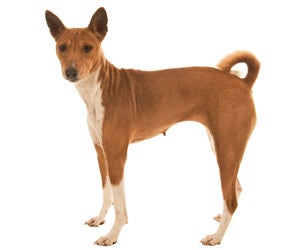Basenji
-
Overview
Basenjis are wild little dogs from the African Congo who may or may not be completely domesticated. Basenjis' unique behavior and cat-like instincts lead many to believe that they have more in common with wolves and wild dogs than other domesticated dogs. Basenjis stand about 16 or 17 inches tall and weigh between 22 and 24 pounds. The Basenji is a unique little dog who will enjoy living with a family who appreciates his quirky habits. Although they don't require much time or effort in the grooming department, they are sensitive little dogs who need a lot of love and some careful training to become gentle, courteous companions.
-
Personality
Just because Basenjis don't bark, don't assume that they're at a loss for expressing themselves. Basenjis do howl, whine and make cat-like sounds to communicate with other dogs and people. They are also extremely alert, intelligent dogs who tend to act on their impulses as sight hounds. They are sensitive dogs who need to be trained with a gentle approach and a thoughtful reward system that praises them for good behavior, because they love to invent their own games. They are agile and quick-moving, so they can suddenly end up on top of the counter or on the other side of the fence if they aren't supervised. These mischievous little dogs are not particularly willing to please. They're constantly looking for a way out of their current surroundings and poking their noses into everything. Basenjis are playful and even goofy, but they do their own thing. They probably won't respond too well to games of fetch. They prefer to explore on their own - leaping, jumping and prancing around outdoors. Although they are independent and not overly forthcoming with affection, they still rely on their owners and will resort to destructive habits if they feel neglected or mistreated.
-
Coat Care
Basenjis have a tightly coiled tail that curls up over their back. They have large, bat-like ears and wrinkled brows that make them look concurrently alert and lost in thought. Basenjis have short coats with such fine hair that it is almost impossible to detect when they shed. Their coats come in chestnut, brown, black and brindle. Some have tricolor coats and all have white feet, chests and tips of their tails.

Basenjis are neat and tidy. They fastidiously groom themselves like cats and they hardly ever shed. That doesn't mean you're off the hook, however. Basenjis will still appreciate a quick rub down with a rubber bristle brush or hound glove about once every other week to help their coat stay shiny and healthy.
Basenjis are unique dogs who groom themselves to stay clean and tidy, so they need to be bathed even less frequently than other short-haired dogs. Bathe them about every four to six months to remove dead hair and keep their coat healthy.
Clipping or trimming your dog’s coat is far easier than you would ever imagine. With the right clipper, trimmer and scissors, giving your dog a haircut is easy on your wallet and your schedule.
Dogs with smooth coats generally only require trims and tidying up in areas of excessive hair growth using a trimmer or blunt scissors. It's always wise to take a dog for a short walk or exercise to calm them down before trimming. Remember to brush the coat first to remove any tangles and mats. Don't forget to trim around the paws, pads, tail, chest and sanitary areas, as needed. The coat should lay flat and smooth against the body when finished.
Trim the Basenji's nails once every other week to make sure that they do not become painful if they don't wear down naturally.
The Basenji requires occasional ear trimming.
Remember to brush the Basenji's teeth at least once a week to help their teeth stay strong and healthy.

 India (English)
India (English)
 Middle East and Africa (English)
Middle East and Africa (English)
 South Africa (English)
South Africa (English)
 Australia (English)
Australia (English)
 Japan (日本語)
Japan (日本語)
 South East Asia (English)
South East Asia (English)
 Singapore (English)
Singapore (English)
 Europe (English)
Europe (English)
 United Kingdom (English)
United Kingdom (English)
 Argentina (Español)
Argentina (Español)
 Brazil (Portuguese)
Brazil (Portuguese)
 Colombia (Español)
Colombia (Español)
 Latin America (Español)
Latin America (Español)
 México (Español)
México (Español)
 Chile (Español)
Chile (Español)
 Peru (Español)
Peru (Español)
 Canada (English)
Canada (English)

